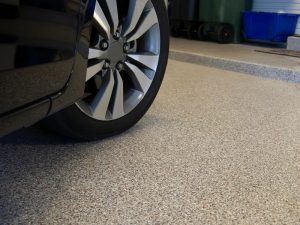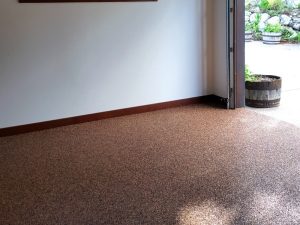Epoxy is a popular choice for garage flooring for homeowners and businesses alike. However, a common concern is whether an epoxy floor becomes slippery when wet. This article will explore the factors that affect the slip resistance of epoxy floors, their safety benefits, and how to ensure that garages remain safe even when wet.
What Factors Affect the Slip Resistance of Epoxy Floors?
Several factors influence how slippery an epoxy floor can be when wet. Understanding these factors can help users make informed decisions when installing or maintaining their garage floors.
- Texture of the Epoxy: Epoxy floors can have varying textures, from smooth to rough. A rough texture generally provides a better grip.
- Additives: Slip-resistant additives can be mixed into the epoxy during application. These additives create a textured surface that improves traction.
- Application Method: The application of epoxy can also affect its slip resistance. A professional installer will ensure an even and safe finish.
- Environmental Conditions: Humidity and temperature can influence how quickly a floor dries, affecting its slipperiness.
Considering these factors, users can choose the right epoxy flooring to meet their needs and reduce the risk of their epoxy floor becoming slippery.
How Do Users Ensure Their Epoxy Floor Is Safe When Wet?
Ensuring that an epoxy floor remains safe when wet involves a few straightforward practices:
- Use Slip-Resistant Additives: Incorporate slip-resistant additives during installation for better traction.
- Regularly Clean Spills: Promptly clean any spills to prevent slips.
- Implement Mats or Rugs: Placemats in areas prone to water accumulation, like near sinks or entry points.
- Maintain Proper Drainage: To ensure adequate drainage and prevent standing water in the garage, regularly inspect and test the drainage system.
By adopting these measures, users can significantly reduce the risk of slips on their epoxy floor, even when wet.
What Are the Safety Benefits of Epoxy Floors in Garages?
Epoxy floors offer several safety benefits, making them suitable for garages. Here are a few key advantages:
- Durability: Epoxy flooring is highly durable and can withstand heavy traffic, making it ideal for garages.
- Chemical Resistance: Epoxy is resistant to oils and chemicals, which helps maintain traction.
- Low Maintenance: Epoxy floors are easy to clean, reducing the chances of slippery conditions caused by dirt and spills.
- Reflectivity: Epoxy floors can enhance lighting in the garage, improving visibility and safety.
By choosing impact-resistant epoxy flooring for garages, users invest in a solution that prioritises safety while being functional and visually appealing.
How Do Environmental Conditions Influence Epoxy Floor Slipperiness?
Environmental conditions play a crucial role in the performance of epoxy flooring. Here’s how they can affect slip resistance:
- Humidity: High humidity can slow drying times, making surfaces more slippery.
- Temperature: Extreme temperatures can affect the curing process of epoxy, potentially compromising its integrity and slip resistance.
- Moisture Exposure: Regular exposure to moisture without proper drainage can lead to slippery conditions.

What Maintenance Practices Can Help Prevent Slippery Conditions?
Routine maintenance is essential for keeping epoxy floors safe. Here are some practices to consider:
- Regular Cleaning: Sweep and mop regularly to remove dirt and debris that can create slippery conditions.
- Inspect for Damage: By checking for cracks or wear that might affect the floor’s integrity, you can improve floor safety through regular inspections.
- Apply a Sealant: Consider applying a sealant every few years to maintain traction and durability.
- Use the Right Cleaning Products: Avoid harsh chemicals that can strip the epoxy and reduce its grip.
By following these maintenance practices, users can ensure their epoxy floor remains safe and functional for years.
Are There Specific Types of Epoxy Flooring That Are Less Slippery?
Not all epoxy floors are created equal when it comes to slip resistance. Here are some types to consider for those particularly concerned about slipperiness:
- Textured Epoxy: This type features a rough surface with a better grip.
- Anti-Slip Epoxy Coatings: These coatings are specifically designed to improve traction.
- Decorative Finishes with Texture: Decorative options often incorporate textures that enhance grip while maintaining aesthetic appeal.
Choosing the best type of epoxy flooring for a garage floor can help users achieve a safe and stylish garage.
What Are the Misconceptions Regarding Epoxy Floors?
Despite their popularity, there are several misconceptions about epoxy floors:
- Epoxy Is Always Slippery: While some epoxy finishes can be slick, many options are designed to be slip-resistant.
- Epoxy Floors Are Too Expensive: While the initial investment may be higher than other flooring options, epoxy’s durability and low maintenance make it cost-effective in the long run.
- All Epoxy Floors Are the Same: There are various types and finishes of epoxy, each with unique properties and benefits.

By addressing these misconceptions, potential users can make more informed decisions about their flooring choices.
Can Users Modify Their Existing Epoxy Floor to Improve Traction?
If users are concerned about the slip resistance of their existing epoxy floor, there are ways to improve it:
- Apply an Anti-Slip Coating: Add a slip-resistant coating over the current epoxy.
- Resurface the Floor: A professional can grind down the surface and reapply a textured finish.
- Use Non-Slip Mats: Strategically placing mats in high-traffic or wet areas can enhance safety.
These modifications can help users maintain a safer garage environment without completely replacing their flooring.
Why Is Choosing the Right Installer Important for a Garage Epoxy Floor?
Selecting a qualified installer is crucial for achieving the best results with epoxy flooring. Here’s why:
- Expertise: A professional installer understands the intricacies of epoxy application and can recommend the best products for specific needs.
- Proper Techniques: Correct installation techniques ensure a durable, slip-resistant surface.
- Warranty and Support: A reputable installer often provides warranties, giving users peace of mind.
Investing time finding the right installer will pay off in the long run, ensuring the epoxy floor remains safe and functional.
Ensuring Safety and Functionality with Epoxy Floors
In conclusion, epoxy flooring is a popular and practical choice for garages, offering numerous benefits, including durability, chemical resistance, and low maintenance. However, concerns about whether an epoxy floor is slippery, mainly when the surface is wet, are valid and can be addressed through informed decisions regarding texture, additives, and installation methods. Non-slip garage floor solutions can provide added safety and peace of mind for homeowners and businesses.
For those looking to enhance their garage with epoxy flooring, Sydney Wide Epoxy Flooring is ready to help! Our experienced team can install and improve epoxy flooring to meet specific needs. Contact Sydney Wide Epoxy Flooring today for a consultation, and let them transform your garage into a safe and stylish space.

